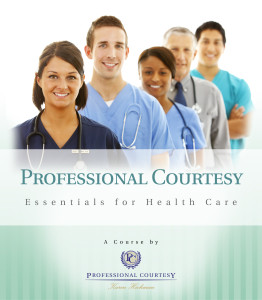Calling Patients to the Exam Room Politely
Calling Patients to the Exam Room Politely
I am often taken aback when I am in a physician’s office waiting area and hear the staff call back their patients to the exam rooms. Many times there is this abrupt voice that comes from a half opened door announcing loudly, HARRY! Nothing else is said and the poor patient gathers themselves up following the nurse or medical assistant down the hall to their designated exam room in silence…no smile, no warm greeting or introduction. Then, if you are lucky, you get to stop in the hall to get weighed on the community scale. One office that I was in recently, even took blood pressures in the hall before directing the patient to the actual exam room. Not too private, at a time when there is so much emphasis on HIPAA privacy guidelines.
I appreciate that practices may want to cut down on expenses by having one or two communal scales instead of one in every room, but getting weighed in public can be pretty humbling. Surely, there is a better way to do this. Gathering patient information should be done in the privacy of the exam room with a closed door, not in the hall leading to the exam rooms.
So, here are some suggestions on how to call a patient back to the exam room politely:
-
To assure you can be seen,walk out into the waiting area as close to the patient as possible to call them back.
-
Smile and greet the patient warmly.
-
Address the patient formally by Mr. Mrs. or Ms. (this is not a privacy violation)
-
Direct the patient as to what room they will be going to. For instance, “third door on the right or room 6.”
-
Don’t ask any medical questions in the hall where answers can be over heard by others.
-
Don’t weigh people in the hall unless the scales are set up for privacy. And take into consideration as to how coats, purses and other extra clothing will get in the way of an accurate weight.
-
Consider taking blood pressures in the exam room, only
-
To identify patients in the waiting area try having the receptionist put a sticky note on the front of the chart using some sort of identifying comment as to who is who. For instance, “red sweater or blue coat.” This then allows you to walk right up to the patient and let them know you are ready to take them back to the exam room.
-
Be prepared to assist older patients or patients who have limitations or obvious injuries back to the room by taking their coats or other personal items.
-
Once the patient is in the room, close the door and keep them apprised of their waiting time.
-
Keep conversations in the hall to a minimum so patients don’t over hear private or inappropriate information.
Trying all of these simple suggestions will leave a much better impression on your patients.
